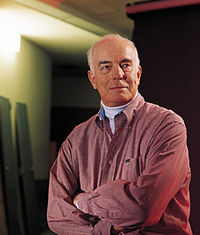

1. Select electors by congressional district.
"I wouldn't want to abolish the Electoral College, just modify it. It serves a pretty good purpose in a continental country like ours. But I wouldn't keep the winner-takes-all system. I think we should turn to assigning each electoral vote by the presidential victor in each congressional district. Two at-large votes would go to the candidate winning the state. This system would have made the situation in Florida much less likely. Sure, you'd have some district recounts, but they would not have consequences as big. Maine and Nebraska assign their electors this way now, so I believe a uniform system could be done without modifying the Constitution. I think it could be done by a vote of Congress, although maybe you have to do it on a state-by-state basis, but I think you could pass a federal law."
2. Legislate uniform closure times and an election holiday.
"The voting polls should close in the continental United States at the same time. That way we wouldn't have the networks making their projections for Florida and having to take it back twice. Also, I would ban the reporting of exit polls while the voting booths are open, although that would probably run into First Amendment conflicts. We have to give the people a clear, free shot at holding an election without the influence of exit polls and called states. In addition, I'd either move the election day to a Saturday or make election Tuesday a public holiday to give people a chance to vote all day."
3. Set restrictions on political contributions.
"This one might require a constitutional amendment, which I am hesitant to suggest, but the soft money contributions and increasing use of personal wealth is getting way out of hand. Maria Cantwell is one example and, in New Jersey, Jon Corzine spent more than $60 million of his personal wealth to get elected to the Senate. What if one of our numerous billionaires decides to run for office? This has gotten so far out of hand that we've got to get this under control. We should institute restrictions on the use of personal wealth and on unbridled money from organizations. The McCain/Feingold proposal isn't enough, because it can't get at the most egregious part of this problem, the soft money."
4. Have instant reporting of contributions on the Internet.
"With our technology, there is no reason we can't require instant identification of contributions to candidates, parties and other political organizations such as PACs. It should be reported instantly when the candidates receive the money and it should be illegal to receive money after the election. Otherwise politicians could spend money on the promise of contributions that would not be reported until after the election. I think these contributions need to be reported instantaneously, not within 24 hours."
5. Establish computerized voting.
"We need to move to a system of computerized or Internet voting. More and more people are comfortable with the Internet. Of course, you've got to make sure that you come up with a system that is absolutely secure and difficult or impossible to cheat. You could end up with a system more accurate and you would count the votes a whole lot faster. We need a thorough examination of our voting system to minimize counting problems and maximize the speed so that we'd know who won by a reasonable bedtime."
What the Future Holds:
"Most of this will come true over a long period of time. The move to reform the Electoral College will come in fits and starts. There will be a number of efforts to eliminate the Electoral College, but the Senate won't pass it. There won't be a three-quarters vote of the states to eliminate the Electoral College. But I think there could be a pretty healthy move to modify the Electoral College to reflect the popular vote more accurately.
"I think there is a fair chance we can change the closure time and make Tuesday a holiday. Computers will happen, it's just a matter of time. And I think it will increase voter participation. Finance reform will be a struggle. It will come piece by piece. No hugely comprehensive campaign finance reform will pass soon. In this Congress you might see a first good step."
|
Dan Evans, '48, '49, our state's pre-eminent Republican, was elected to the Legislature in 1956 and became governor, at age 39, in 1964. After three terms, he became president of Evergreen State College (1977-83) and later a U.S. senator (1983-89). He is now a UW regent, adviser to the UW Evans School of Public Affairs and on the boards of many corporations and non-profit groups. He is also working with Sasquatch Books to write a memoir of his political career.